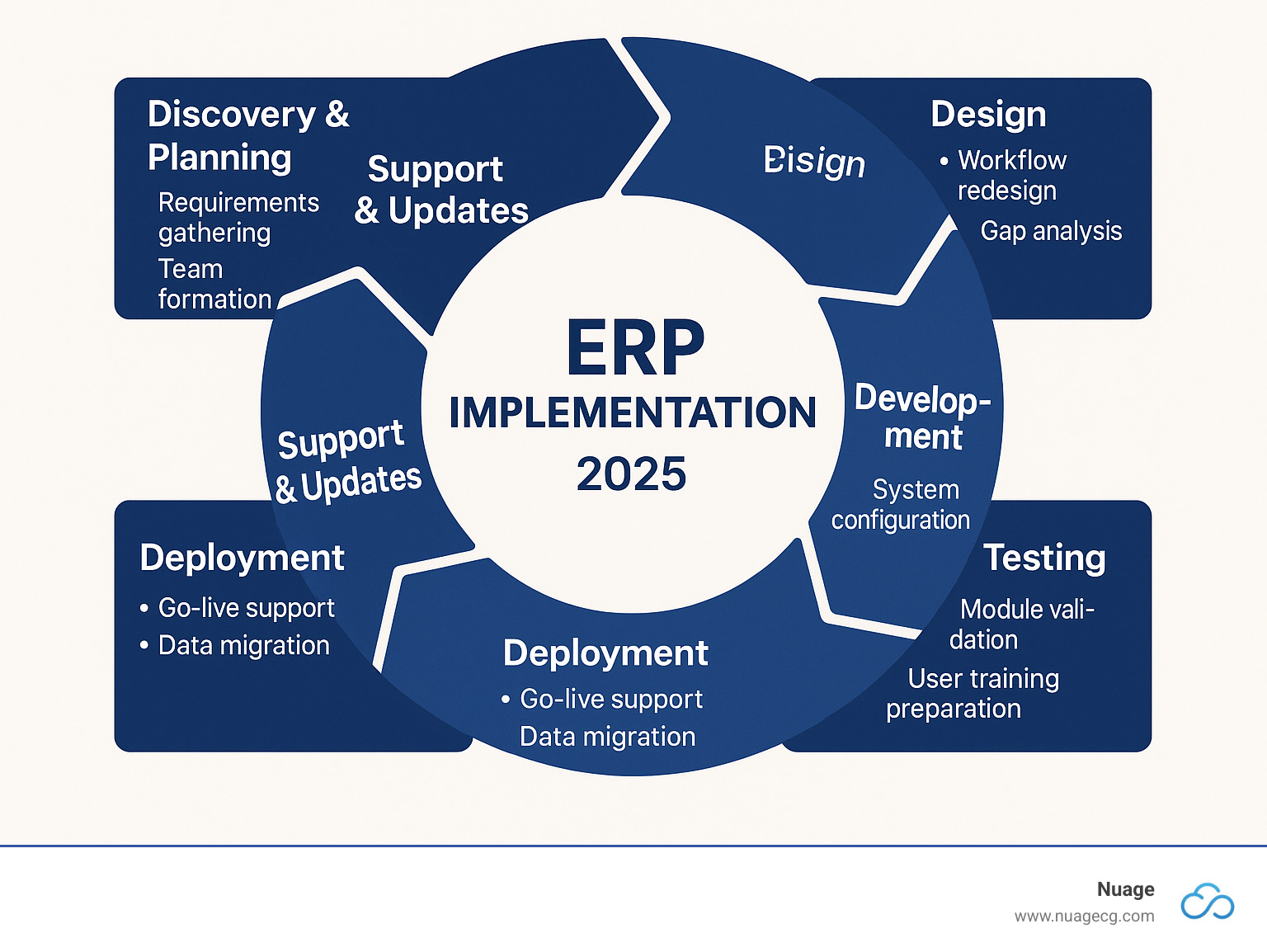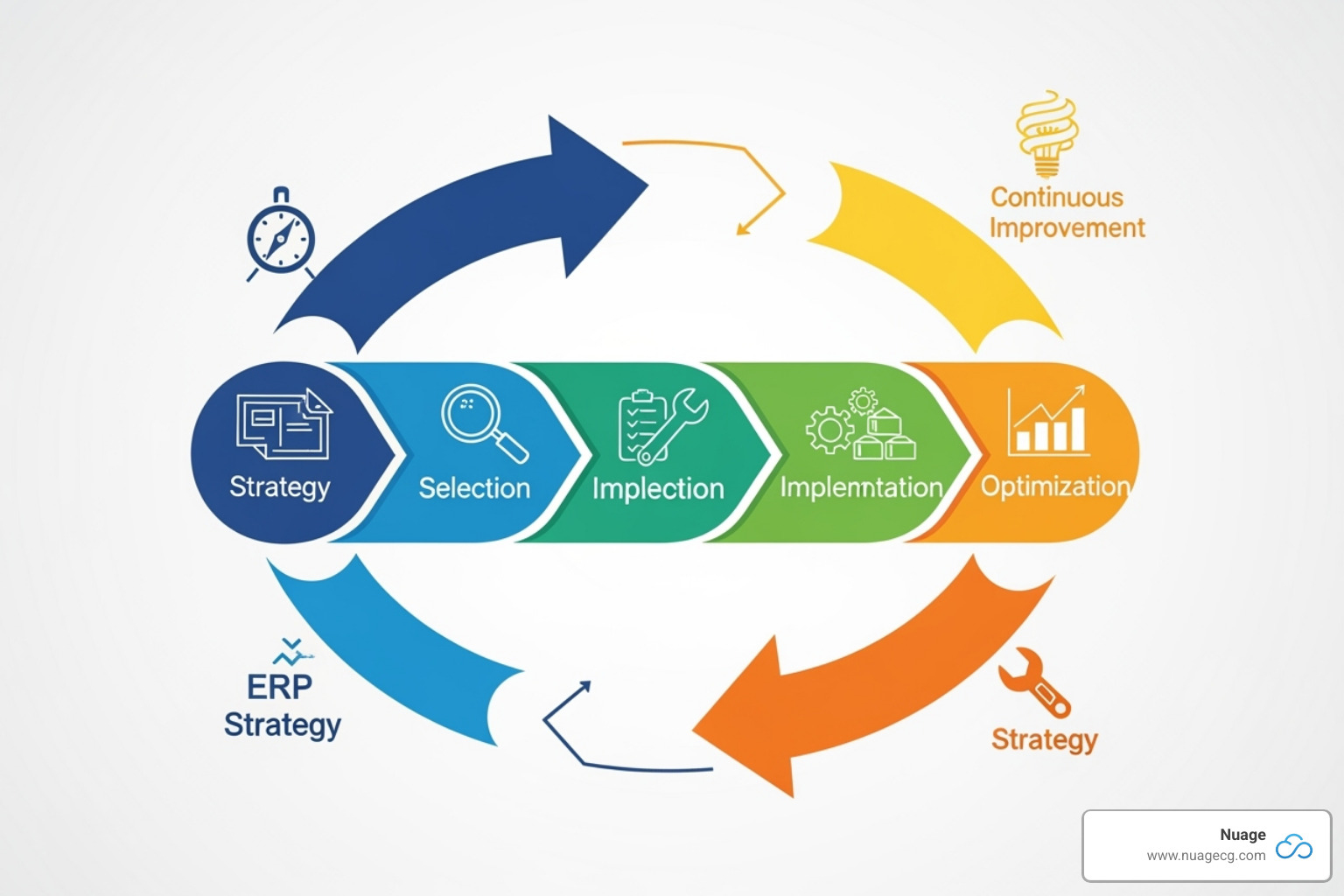Your Strategic Partner in Digital Change
An ERP software implementation consultant is a specialized professional who guides businesses through the complex process of selecting, implementing, and optimizing Enterprise Resource Planning systems to drive operational efficiency and business growth.
Key roles of an ERP consultant include:
- Project Leadership: Manages the entire implementation from planning to go-live.
- Business Analysis: Evaluates current processes and designs future-state workflows.
- Risk Mitigation: Prevents common pitfalls that cause 2x-4x budget overruns.
- Technical Configuration: Customizes the system to meet specific business requirements.
- Change Management: Ensures user adoption and organizational buy-in.
- Training & Support: Prepares teams for successful system utilization.
The stakes are high in ERP implementations. Research shows that companies attempting ERP projects on their own typically spend 2x to 4x their original budget and timeline. As one industry expert notes: “Simply put, when it comes to searching for the right ERP advisory firm, if they are not independent, you are wasting your time.”
Businesses hire ERP consultants to save money, reduce implementation time, access proven methodologies, and bridge the gap between business needs and technical capabilities.
I’m Louis Balla, and I’ve spent over 15 years guiding businesses through digital changes and ERP implementations, particularly helping companies maximize their NetSuite potential. As an ERP software implementation consultant, I’ve seen how the right guidance can transform a risky technology project into a catalyst for business growth.

What is an ERP Implementation Consultant and Why Do You Need One?
Picture this: you’re facing a digital change that could revolutionize your business, but the path is a maze of technical jargon and budget risks. This is where an ERP software implementation consultant becomes your strategic partner.
An ERP consultant is your project quarterback, combining technical knowledge with business acumen to guide your ERP journey. They act as the bridge between your business goals and the complex world of enterprise software. The complexity of modern ERP systems, combined with the challenges of change management, makes expert guidance essential.
A skilled consultant can save your company over a month from selection through implementation and deliver substantial cost savings throughout the ERP lifecycle. More importantly, they free up your internal team to focus on core business operations.
Great consultants bring an objective perspective from hundreds of implementations. This breadth of experience allows them to spot potential issues before they become problems and recommend solutions custom to your industry. This risk mitigation alone justifies the investment, helping to maximize your ROI by ensuring your ERP system delivers the efficiency gains you’re investing in.

The Core Responsibilities: From Blueprint to Go-Live
An ERP software implementation consultant wears many hats. The journey starts with project management and deep business process analysis to understand how work gets done. This informs requirements gathering, where we translate business needs into technical specifications. During system configuration, we customize the software to match your redesigned processes, while managing the critical data migration from old systems.
Success hinges on people, so we develop comprehensive user training and drive change management to address resistance and build excitement. Finally, post-launch support ensures your investment continues to pay dividends as we monitor performance and optimize the solution as your business evolves.
Independent Advisor vs. Vendor Partner: What’s the Difference?
The consulting world has two camps: independent consultants who work for you, and vendor-partner consultants who work for the software company. This distinction is critical.
As an independent advisor, our success is measured entirely by your success. We have no financial incentive to push a particular software solution. Vendor-partner consultants, while skilled, operate with an inherent conflict of interest. They are incentivized to fit your business into their software, not find the software that best fits your business.
| Aspect | Independent Consultant | Vendor-Partner Consultant |
|---|---|---|
| Objectivity | Complete – no vendor ties | Limited – tied to specific software |
| Conflict of Interest | None – client success is the only goal | Present – vendor success affects their success |
| Software Selection | Evaluates all options objectively | Limited to their vendor’s solutions |
| Expertise | Broad industry and multi-system knowledge | Deep expertise in specific vendor products |
| Approach | Client-first problem solving | Often sales-focused on vendor solutions |
Our independence means we can recommend NetSuite when it’s the right fit, or suggest alternatives when it’s not. Nuage combines this independent objectivity with certified expertise. We are NetSuite partners because we believe in the platform, but we are not beholden to it. Your long-term success is what builds our reputation.
A Deep Dive into the Services of an ERP Software Implementation Consultant
An ERP software implementation consultant is your strategic partner through every phase of the digital change journey. Successful ERP projects require a blend of strategic planning, technical execution, and people-focused adoption. This combination transforms a software installation into genuine business change.
The ERP lifecycle is a continuous journey of improvement. Whether you’re implementing your first ERP, upgrading a legacy system, or optimizing an existing one, we meet you where you are.

Phase 1: Strategy, Selection, and Business Process Improvement (BPI)
This foundational phase transforms a vague need for “new software” into a precise operational strategy. We start with a thorough needs assessment to identify pain points and growth opportunities. We map your current business processes to find bottlenecks and then work with you to design an improved future state. This isn’t about forcing old processes into new software; it’s about reimagining how work gets done.
With a clear vision, we conduct an objective software evaluation, shortlisting solutions like NetSuite or other platforms that truly fit your requirements. Our experience provides leverage during contract negotiations, ensuring fair pricing and terms. Finally, we help you build a compelling business case that clearly articulates the project’s return on investment.
Phase 2: Implementation, Customization, and Integration
This is where the plan becomes a reality. We establish clear project governance with a dedicated project manager as your single point of contact. For system configuration, we leverage standard functionality whenever possible for reliability and cost-effectiveness, developing custom workflows only when necessary.
A meticulous data migration strategy is crucial. We manage the process of cleaning and moving your critical data to prevent future headaches. Our thorough testing protocols include unit, integration, and user acceptance testing to ensure the system meets daily business needs. We also manage integrations with your other critical applications (e.g., CRM, e-commerce) to create a seamless digital ecosystem. Learn more about how we optimize these connections through our NetSuite partnership.
Phase 3: Driving Success Through Change Management and Training
A perfectly configured ERP system is worthless if your team doesn’t use it. That’s why change management and training are integrated throughout our entire process. We secure stakeholder buy-in from the top down and develop communication plans to keep everyone informed. We address user resistance head-on by involving key users in the design process and highlighting personal benefits.
Our training materials are custom to your specific workflows, not generic software features. During the critical first days of go-live, our team provides intensive support to ensure a smooth transition. Our job isn’t done at launch; we focus on measuring success and ensuring user adoption to maximize the long-term value of your ERP investment.
Selecting the Right Consultant: A Checklist for Success
Choosing the right ERP software implementation consultant is a critical decision that can determine the success of your digital change. Think of it like hiring a contractor to build a dream home—you need to check references, review past work, and ensure they understand your vision.

Key Factors to Evaluate in an erp software implementation consultant
When vetting potential partners, focus on these key factors:
- Industry-Specific Experience: Does the consultant have a proven track record in your industry? This ensures they understand your unique workflows, regulations, and KPIs.
- Technical Certifications and Expertise: Are they certified in the ERP systems you’re considering? This technical foundation is essential for complex configuration and integration.
- A Proven Methodology: A structured, repeatable process reduces risk and provides a clear roadmap for success. Our “Total Certainty™” selection process, for instance, has a 100% go-live success rate.
- Case Studies and References: Ask for examples of successful implementations in businesses similar to yours. Speaking with past clients offers invaluable insight.
- Communication and Problem-Solving Skills: Your consultant must be a clear communicator and a creative problem-solver, capable of navigating unexpected challenges.
- Independence: Ensure they have no financial ties to specific software vendors, guaranteeing their recommendations serve your best interests.
Ask potential consultants about their methodology, request industry-specific references, and inquire about how they handle change management, data migration, and budget adherence.
Understanding the Cost Structure and Calculating ROI
Understanding the cost of an ERP software implementation consultant helps you calculate your return on investment. Fees are typically structured as hourly rates ($150-$250) or, more commonly for large projects, as project-based fees in a Statement of Work (SOW). This provides cost predictability.
When considering the cost, focus on the ROI. A great consultant can save clients over a month in implementation time and an average of $160,000 over the ERP lifecycle. These savings come from:
- Avoiding budget overruns common in DIY projects.
- Faster implementation, which accelerates your time-to-value.
- Optimized processes that boost long-term productivity.
- Better decision-making through accurate, real-time data.
- Reduced risk related to data migration, integration, and user adoption.
The question isn’t whether you can afford a consultant, but whether you can afford not to have one.
The Career Path of an erp software implementation consultant
The career of an ERP consultant is built on a foundation of continuous learning and diverse experience. They progress from analyst roles to senior consultants, project managers, and directors, accumulating deep knowledge across various industries and technologies. This journey, often involving specialization in platforms like NetSuite, equips them with a unique perspective on what drives project success. Their ability to understand end-to-end business operations and how technology can streamline them is the invaluable expertise you want on your side.
Frequently Asked Questions about ERP Consultants
How can an ERP consultant help rescue a failing project?
An ERP software implementation consultant can turn around a failing project by first conducting an objective assessment to identify the root cause of the problems, whether it’s scope creep, poor change management, or technical issues. This isn’t about assigning blame but about creating a clear path forward.
Once the issues are understood, the consultant works to realign the project with the original business goals. They create a realistic, revised timeline and budget. A key role is acting as a neutral mediator between your team and the software vendor, rebuilding communication and trust. By re-establishing proper project governance and implementing robust testing and training, they can get the project back on track to deliver real value.
How does a consultant ensure the ERP system aligns with our specific industry needs?
One size does not fit all in ERP. A consultant ensures alignment through deep industry expertise, often gained from having worked directly in the industries they now serve. They understand the specific operational workflows, regulatory requirements, and business cycles that make your industry unique.
The process begins with a deep-dive needs analysis to uncover your specific challenges and requirements. This practical, hands-on understanding allows them to configure an ERP system, like NetSuite, to fit your business like a glove. The goal is to tailor the technology to support your processes, not force your processes to fit a generic software template.
What is the most critical role an ERP consultant plays in a project?
While technical skill and project management are vital, the most critical role an ERP software implementation consultant plays is that of a change agent and strategic advisor. An ERP implementation is fundamentally a business change project, not just a technology one. The best-configured system will fail if people don’t accept it.
The consultant bridges the gap between business leaders and IT teams, ensuring the project remains focused on delivering tangible business value. They translate executive goals into technical requirements and manage the human side of the transition. Their leadership in change management—building buy-in, addressing concerns, and ensuring effective training—is what drives user adoption and ultimately determines the project’s long-term ROI.
Conclusion: Your Engine for a Successful ERP Journey
Choosing the right ERP software implementation consultant is a critical investment in your company’s digital future. They are more than software installers; they are strategic partners, risk mitigators, and change champions for your ERP journey.
Statistics show that companies going it alone often face budget overruns of 2x to 4x. With the right consultant, you can save over a month in implementation time and an average of $160,000 over your ERP lifecycle. You gain a trusted advisor who ensures your technology investment transforms your business.
What makes a great ERP consultant invaluable:
- Strategic Vision: Aligning technology with your business goals.
- Industry Expertise: Understanding your unique operational challenges.
- Change Management: Driving user adoption to maximize ROI.
- Technical Knowledge: Bridging business needs and system capabilities.
- Independence: Guaranteeing objective, client-first recommendations.
At Nuage, we’ve spent over 20 years helping businesses steer digital change. We don’t just sell software; we identify the right solutions for your specific needs, combining deep technical expertise with a commitment to your long-term success.
Your ERP implementation is about opening up your organization’s potential. The right ERP software implementation consultant doesn’t just manage a project—they become your engine for change.
Ready to power your business growth? Let our NetSuite optimization engine drive your success story.
